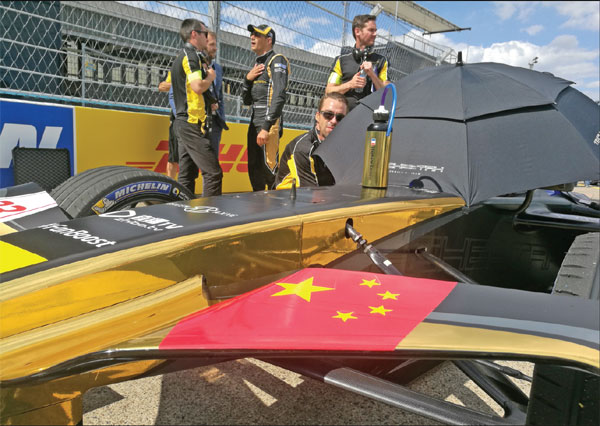Electric cars take fast lane
Formula E captures the imagination as China races ahead with environmentally friendly technology
When Alejandro Agag took the wheel as CEO of the Formula E championship five years ago, cynics claimed the sport would struggle to catch on. Electric racing cars are unable to match the power and noise of those with combustion engines, and many hardcore motorsport fans doubted Formula E would be thrilling enough to build a real support base.
What the doubters failed to recognize is that some of the biggest car manufacturers in the world were already locked in an arms race to successfully develop electric vehicles for mass production. And many identified the fiercely competitive world of sport racing as the ideal proving ground for their technologies.
|
The Chinese flag is displayed on a team Techeetah car undergoing pre-race preparations. Photos by Angus Mcneice / China Daily |
The teams, sponsors and partners for Formula E's inaugural 2014-15 season boasted some of the biggest names in the auto industry, including Michelin, Williams, Audi and Renault. There was also strong name recognition among the drivers. Nico Prost and Nelson Piquet Jr, sons of Formula 1 stars Alain Prost and Nelson Piquet, and Bruno Senna, nephew of racing legend Ayrton Senna, were all behind the wheels of the new generation of race car.
Formula E pulled in 190 million viewers worldwide that season. Against the odds, Nelson Piquet Jr won the championship by one point for Team China Racing.
"It was the under dog team, with the smallest budget at the time," Piquet Jr tells China Daily from the tarmac at Tempelhof Airport, site of this month's Berlin ePrix. "To step into the car and win it was an amazing feeling."
Chinese involvement has since increased rapidly. Team China Racing rebranded as NextEV NIO, owned by Chinese premium electric car manufacturer NIO. Team Techeetah, owned by Chinese sports marketing company SECA, entered the sport last year after acquiring Team Aguri. Chinese billionaire Jia Yueting is one of the investors behind US team Faraday Future Dragon Racing.
Last month, Chinese basketball star Yao Ming's company Yao Capital and public equity firm China Media Capital together acquired a stake in Formula E Holdings. The multimillion-euro deal made the Chinese investors the third largest shareholders in the company. Li Sheng, CEO of SECA, which is backed by CMC, now sits on the Formula E board.
"We had the hope that we would get traction in China and now, with Chinese teams and Chinese investors, that is confirmed," Agag told China Daily. "In China, electric vehicles are a priority, and they see Formula E as a platform to develop their strategy in electric mobility."
Agag calls the level of Chinese involvement in Formula Ea "positive surprise".
He says: "Chinese companies are taking it seriously. We had contact from a lot of Chinese investors. We decided to do this strategic investment with CMC and Yao. They are very committed to us, they are great financial and strategic investors and they can help us grow in China."
Agag says Chinese TV viewing of Formula E is consistently rated in the top five, with between 1 million and 3 million tuning in to watch ePrix events on CCTV.
The championship has held an ePrix in China in all three seasons - twice in Beijing and once in Hong Kong - and Agag is in talks about adding Shanghai to the calendar, which he expects to confirm two seasons from now.
"The priority for season five is to have a race in the Chinese mainland," Agag says. "All the teams want it. We are going to keep Hong Kong and we had a very good meeting in Shanghai with the deputy mayor. We looked at some very cool locations there to do the race."
Agag links China's enthusiasm for Formula E with the country's efforts to combat climate change. China invested $102.9 billion in renewable power and fuels in 2015, more than a third of the global total, and the government is discussing legislation that would see domestic automakers produce a mandatory percentage of electric vehicles annually.
"The Chinese government is taking leadership in the fight against climate change," Agag says. "We are getting toward a point, in two, three or five years, when suddenly there will be a massive change toward electric cars. And China will be at the forefront. China is the place where the battle will be won. If we win in China with electric cars, the whole world will follow."
angus@mail.chinadailyuk.com



















